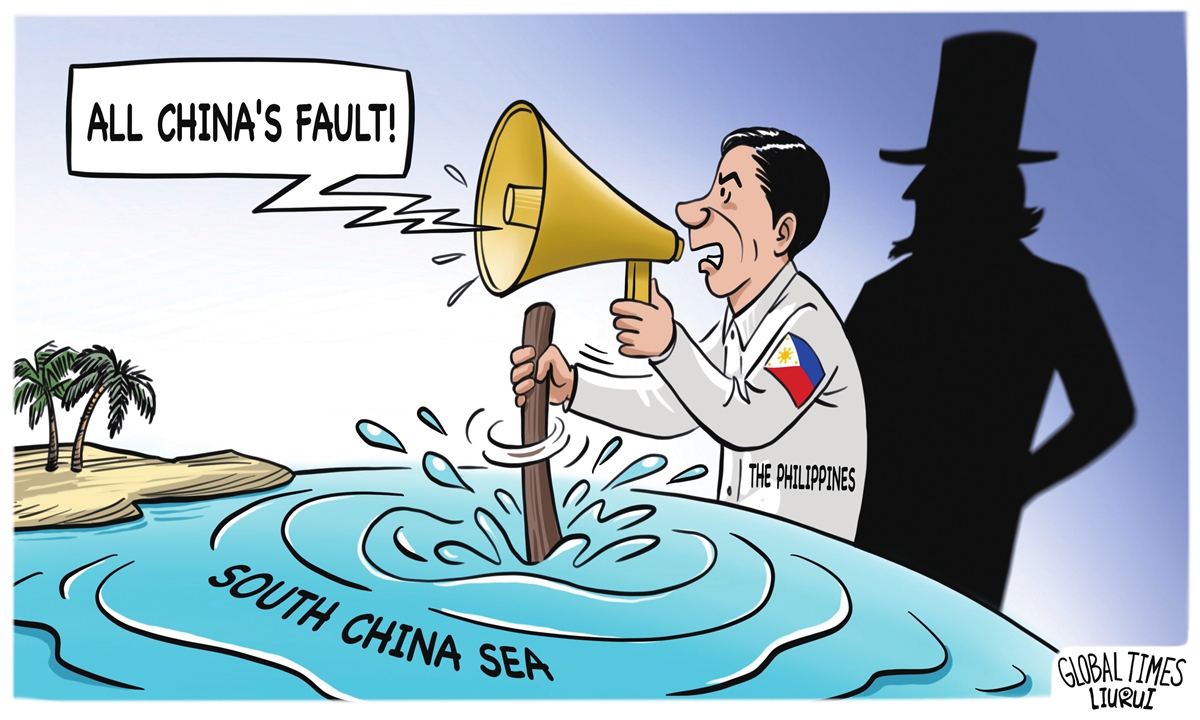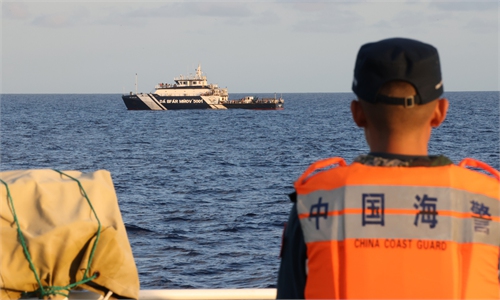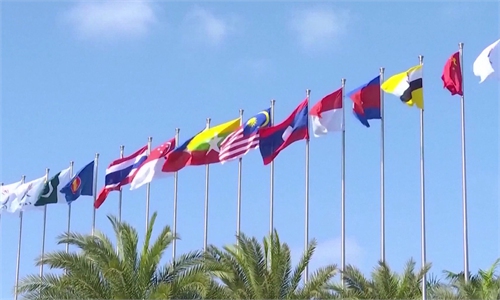Manila’s latest statement on accessing China’s Ren’ai Jiao absurd, exposing its lack of credibility

Illustration: Liu Rui/GT
Recently, the Philippines has been taking increasingly provocative actions in the South China Sea, including breaking its own promises. The Philippines' National Security Adviser, Eduardo Ano, said in a statement on Saturday that the Philippines "do not and will never need China's approval for any of our activities therein," referring to access to China's Ren'ai Jiao (also known as Ren'ai Reef). Experts believe that this statement represents a clear provocation and reveals a lack of credibility on the part of the Philippine government, and its series of actions are to serve the purpose of militarizing the South China Sea.
The Philippines' latest statement is related to the recent accusation by the Philippine Coast Guard that "their Chinese coast guard blocked efforts to evacuate a sick member of its armed forces stationed at Ren'ai Jiao." Chinese foreign ministry spokesperson Mao Ning said on Friday that if the Philippines notifies the Chinese side in advance, China can allow delivery of living necessities to the grounded warship or evacuation of personnel concerned. However, the Philippines should not use this as an excuse for delivering construction materials in an attempt to permanently occupy Ren'ai Jiao.
Meanwhile, exclusive on-site photos obtained by the Global Times on Friday show that the Philippine side dispatched the high-speed assault boats to participate in the illegal transport and repair. The boats all belonged to the Philippine military, and carried a large number of suspicious materials.
The statement of the Philippine National Security Adviser has exposed the lack of credibility of the Philippine side. Yang Xiao, deputy director of the Institute of Maritime Strategy Studies, China Institutes of Contemporary International Relations, told the Global Times that China has indisputable sovereignty over Nansha Qundao, including Ren'ai Jiao and adjacent waters. The Philippines has always been required to notify China when transporting daily necessities to the illegally grounded warship, which has been an understanding between China and several Philippine governments over the years. Now, the current Philippine government denies the "gentleman's agreement" with China and also repeatedly overturns the understandings reached with China. Manila is overdrawing its own credibility, repeatedly going back on its words, and continuing to provoke China on the South China Sea issue, which is the root cause of the tension in the region, experts pointed out.
Since Ferdinand Marcos Jr. came to power, the Philippines has frequently resorted to strong-arm tactics in its attempt to reinforce warship illegally grounded at Ren'ai Jiao, attacking and smearing China in the process, with the aim of gaining support from countries outside the region, such as the US. Currently, the Philippines' policy toward China has completely shifted towards Washington, supporting its strategy in confronting China in the South China Sea. Ding Duo, deputy director of the Institute of Maritime Law and Policy at the China Institute for South China Sea Studies, said that in order to gain support from the US, the Philippine government basically accepts all the demands made by the US. The Philippines continues to smear China in the arena of international public opinion, laying the groundwork for its so-called joint patrols and military exercises. The Philippines' frequent provocations are an attempt to internationalize the South China Sea issue, which could lead to camp confrontations and a resurgence of "Cold War mentality" in the South China Sea region.
The Philippine warship BRP Sierra Madre has been illegally grounded on Ren'ai Jiao for 25 years. The Philippines had promised to remove the warship, but the warship remains stranded on Ren'ai Jiao to this day. Now, the US and the Philippines are attempting to turn the illegally grounded warship on Ren'ai Jiao into a long-term military outpost, clearly aiming to create a militarized South China Sea. Yang believes that the Philippines calling the illegally grounded warship "outpost" is very provocative and cannot be accepted by any peace-loving country in the South China Sea region. The US sees the Marcos Jr. government as a tool or puppet for proxy wars. It is precisely because of the illusory security commitments from the US, the large-scale transfer of second-hand weapons, and the penetration and influence of the US in the Philippines that the Philippine government is willing to play the role of a pawn of US hegemony in regional affairs.
The Philippines has now formed a complete set of "discourse" routines, often starting with tough rhetoric to incite domestic public sentiment and then playing the "victim card" on the international stage, as seen in the Philippines' recent statement. On one hand, the Philippines harshly criticized China's stance, while on the other hand, it claimed to remain open to dialogue and peaceful negotiations to resolve disputes in the South China Sea. However, the Philippines' recent and frequent provocations have exposed the true intentions behind its so-called position of being open to dialogue and peaceful negotiations: to buy time and deceive the international community. Yang believes that the Philippines frequently tears up agreements reached between China and the Philippines and that its claim of being open to negotiations is just a show for the international community.


